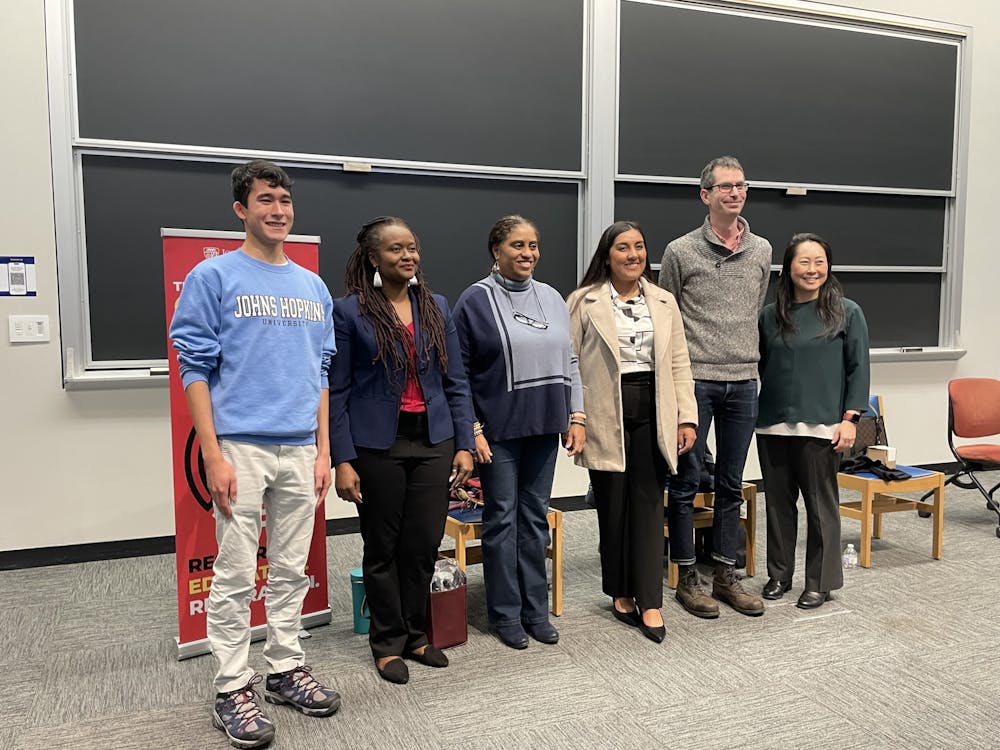On Thursday, Feb. 6, the Chloe Center for the Critical Study of Racism, Immigration, and Colonialism hosted a panel "From the Borderlands to Baltimore: Meeting the Challenges for Refugees Today" in conjunction with the Center for Social Concern and the Program in Latin American, Caribbean and Latinx Studies. A reception was held following the panel to celebrate the launch of the new Critical Diaspora Studies undergraduate major offered by the Chloe Center.
The panel featured Susana Gastelum from SAMU First Response, Yaneldis Boullon from Esperanza Center Health Services and Fatmata Barrie from Barrie Law Center. During the event, the panelists discussed the current migration system, their personal experiences as first points of contact for migrants, as well as how they are navigating the new challenges arising under the Trump administration.
Gastelum, who has been working for several years at a now closed migrant shelter in Tucson, Ariz., began by describing the impact of changes in migration policies. She explained that the policies such as an executive order last June, have not only impacted migrants by leading to fewer arrivals, but also the people who work with and aid migrant populations.
“We were employing food companies, janitorial companies, transportation. And now all these people have been laid off,” she said.
Gastelum further discussed abrupt halt of policies permitting people to seek asylum and enter the country will have worsened the conditions of the hundreds of people already residing in small communities across the U.S. border. She explained that these individuals are trapped in limbo and face uncertainty as their scheduled appointments with U.S. authorities have been canceled.
Another effect of new policies discussed by the panelists was a sense of fear amongst undocumented migrants and asylum seekers. All three workers commented on how some migrants they interact with now refuse to go to hospitals or send their kids to school, due to the changes in immigration policies that no longer keep those spaces as safe from immigration authorities. Boullon acknowledged the harsh reality that, depending on the county in Maryland that one lives in, for instance, one might be more at risk of being questioned. They also explained, however, that deportations have always been a part of government policies and that creates fear in these communities.
Barrie, a lawyer who has been working with migrants for several years, explained that her legal advice and counseling are crucial to make sure that her clients know their rights and are able to successfully navigate the immigration system.
“They say an attorney is a counselor, and I am doing a lot of counselor part and having to calm people down and have them understand that the images they see online are purposeful,“ she stated. “We’ve always had removals and deportations. It’s nothing new, but the images are purposeful. It’s there to imprint people’s minds and psyches to be frozen with fear.”
In Baltimore specifically, Boullon emphasized that many people still need the assistance of the Esperanza Centre and that the need for help has not diminished with the new administration. .
The discussion also considered the ways in which NGO workers are able to look after themselves when working in such a high-stress environment. The three speakers acknowledged the importance of self-care and staying motivated and resilient. While Gastelum finds this motivation in her desire to create a better world for her child and helping other mothers, Boullon talked about the importance of celebrating and serving her community.
Maryam Amosu, a senior attending the event, described her appreciation for the insights shared by the panelists and shared that the panel opened her eyes to the challenges professionals face in providing assistance migrants in an interview with The News-Letter.
“If it’s stressful for us just hearing about it, you can’t imagine how much it must be for them, actually being there and trying to help as many people as possible,” she said.
While most of the conversation was about Baltimore and the U.S., migration was also addressed in a global context, with Barrie highlighting that past and current neocolonial systems have contributed to inequalities and power asymmetries and created conflict globally that forces people to leave their countries of origin.
After the event, The News-Letter interviewed Christopher Amanat, a first-year student majoring in History and Critical Diaspora Studies who helped organize the event. Amanat previously worked in a shelter in Arizona for months with Gastelum, and shared his motivation for the event was to raise awareness about the reality of working in immigration, especially under the new administration. He insisted on resilience and community work in this environment.
“If you are an immigrant yourself, or if you have family who are immigrants, or if you have a family member who is undocumented, and you feel afraid and you feel alone, know there are people fighting for you,” he said. “I am fighting for you. We can only make a change together.”
Editor’s Note: A previous version of this article incorrectly spelled Maryam Amosu’s name.
The News-Letter regrets this error.

















